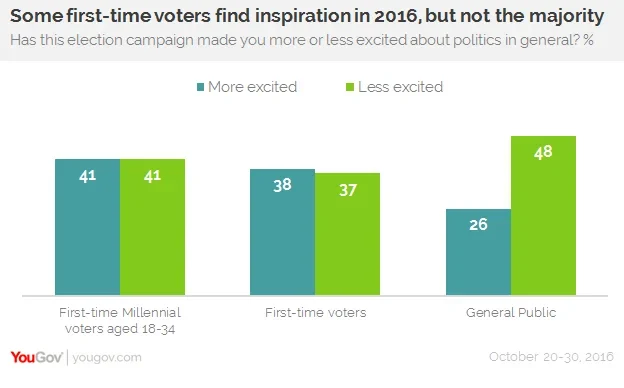38% of first-time voters say the election has made them more excited about politics, while 37% say the opposite
For first-time voters without much exposure to national campaigns, the 2016 presidential election has been quite the introduction. Whatever the outcome, academics and pundits will be studying its influence on American politics for years to come.
New data from YouGov suggests one upshot of the contentious campaign: first-time voters are about as likely to say the experience has made them feel less excited about politics as they are to say the opposite. Specifically, first-time voters are split 38% "more excited" to 37% "less excited" now that the election is drawing to a close. 24% have a neutral attitude. Among the general population, reactions tilt more negative, with 48% less excitied and 26% more.

Young voters
While first-time Millennial voters aged 18-34 in particular show even higher levels of political excitement due to the election (41%), Millennials as a whole are less enthusiastic, with only 28% saying the campaign has left them feeling more excited about politics.
When asked whether each candidate speaks for their generation, Millennials are divided on Hillary Clinton, with 38% agreeing she does and 40% disagreeing. However, the balance of opinion was more favorable for Clinton's party in general, with 41% feeling represented by the Democratic Party and 33% feeling otherwise.
Reactions were much more negative about Trump and the Republican Party. Regarding either, only about one in five Millennials feel represented (by contrast, 40% of Americans aged 55 and older feel Donald Trump represents their generation, compared to 33% for Clinton).
For first-time Millennial voters aged 18-34, the question of who speaks for their generation breaks down as follows: 47% agree for Clinton, 46% for the Democratic party, 26% for Trump, and 20% for the Republican party.








